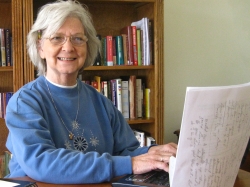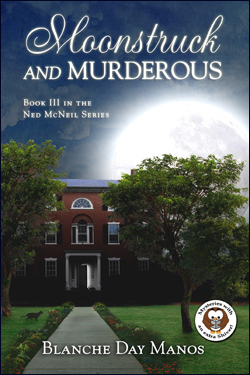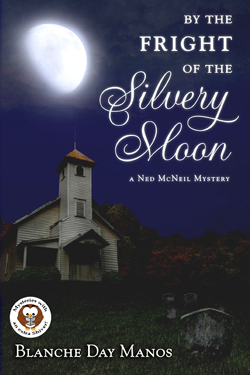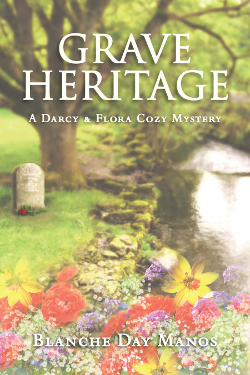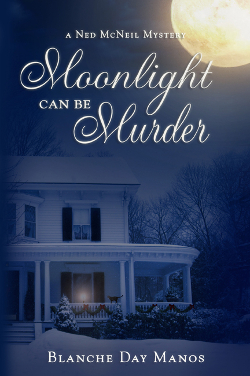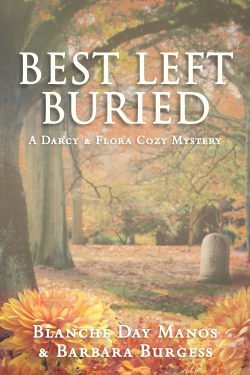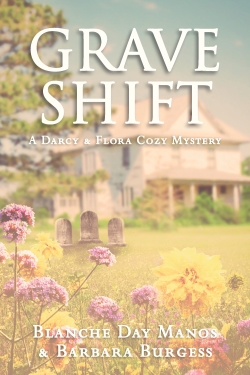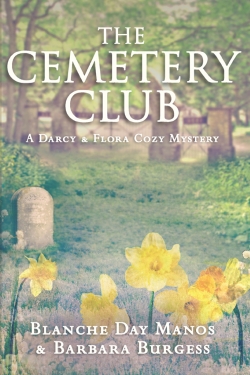I awoke sitting straight up in bed, my heart doing double time. Was it rain pounding against my bedroom windows or the wind roaring around the house that had awakened me? Jethro, his feline apprehension alerted by my sudden movement, jumped from my bed and darted from the room.
Straining to hear, I hardly dared to breathe. There! It wasn’t the wind; someone was banging on the front door.
Sliding my feet into house shoes, I trotted into the hall. Mom hurried from her room, a robe around her shoulders.
“Darcy,” she whispered, gripping my arm, “What was that noise?”
“Someone is at the door.” I don’t know why we whispered; no one could have heard us above the clamor of the storm.
We crept downstairs, our way lit by continuously flashing lightning. Rain, flung against the house as if by a giant hand, sluiced down the windows. The frantic pounding came again.
“What poor soul would be out on a night like this?” Mom said, going to the door.
I grabbed her arm. “No, wait! Let me look first.” Pulling aside the curtain, I craned my neck to see the porch. She was right. The drenched person who huddled there did indeed look like a poor soul. He was dripping and shivering, but with lightning flashes illuminating his hunched shape, he seemed more menacing than pitiful. What was he doing out here, far from town in such a downpour?
“I am going to get Dad’s gun,” I said. “Don’t open the door until I tell you.”
She frowned. “What? Why, Darcy?”
“Because there’s a man on our porch in the middle of the night and we don’t know who he is. Whether he needs help or not, we’ve got to be cautious. Who knows? He may be armed or dangerous.”
Mom sniffed. “I guess.”
At our former home in Levi, I had kept Dad’s pistol in a drawer of the bookshelf. This new house also had a large, built-in bookshelf with drawers, most handy hiding places. Mom, ever trusting, would never have thought about the gun but I, a seasoned investigative reporter for the Dallas Morning News and ever suspicious, felt safer knowing it was there.
My fingers touched the cold metal of that reassuring firearm. Holding it behind my back, I nodded toward Mom.
“Okay, switch on the porch light and open the door.”
She swung the door inward and stepped back. A wet and bedraggled man stumbled into the living room. The first thing I thought of was a drowned rat, not that I had ever seen one. The man’s thin, gray hair was plastered against his scalp. He was smallish, and being bent over seemed to be his normal stance. Rain dripped from his beak-like nose and ran down his stubbly chin.
Wiping his eyes, he blinked at us.
“Thanks,” he croaked. “I was about to drown out there.”
Fearful that Mom was going to offer him a towel to dry off and maybe invite him to the kitchen for a piece of pie, I tried to forestall the Southern hospitality for which she was famous.
Although a born Oklahoman, my first impulse was to be careful instead of hospitable. “Who are you?” I asked. “What are you doing out in the storm? Did your car break down somewhere?”
The man squinted at me, then his gaze shifted back to Mom. Again, he rubbed his hand across his eyes as he leaned forward and peered closely at her. He swallowed a couple of times, licked his lips, and asked in a hoarse whisper,
“Never mind who I am. Who are you?”
Sidling away from such close scrutiny, Mom said, “I’m Flora Tucker and this is my daughter Darcy Campbell.”
The man’s face underwent a change. His mouth dropped open and his eyes widened. He backed out of the door, whirled around, and bolted across the porch, disappearing into the darkness.
Mom slammed the door, locked it, and drew a deep breath.
“Whew! What in the world was that about?” she asked. “Who was that strange little man and what scared him off? Did he see your gun, Darcy?”
“No. I kept it behind me. I don’t think you look particularly scary, Mom, but he sure gave you the once over. He didn’t panic until you told him your name.”
